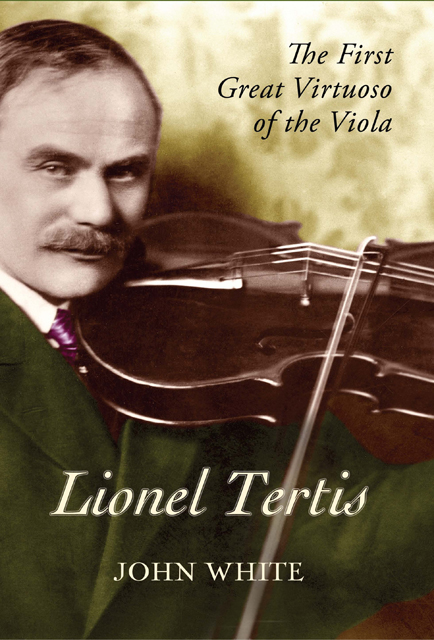Book contents
- Frontmatter
- Dedication
- Contents
- List of illustrations
- Foreword
- Preface
- Acknowledgements
- 1 The Tertis Family
- 2 Early Career
- 3 The Great War
- 4 The Chamber Music Players
- 5 American Tours
- 6 Return to the Royal Academy of Music
- 7 The Elgar and Walton Concertos
- 8 The BBC Orchestra, Delius, Bax and Vaughan Williams
- 9 A Shock Retirement
- 10 The Richardson–Tertis Viola
- 11 The Second World War
- 12 Promoting the Tertis Model Viola
- 13 Return to America and Eightieth Birthday Celebrations
- 14 Second Marriage and Last Appearance
- 15 TV Profile and Ninetieth Birthday
- 16 Final Years
- Notes
- Appendix 1 Tertis’s Violas
- Appendix 2 The Tertis Model Viola
- Appendix 3 Tertis’s Writings and Talks
- Appendix 4 Tertis’s BBC Appearances
- Appendix 5 Tertis’s Honours
- Appendix 6 Music with Tertis Connections
- Appendix 7 The Tertis Bequest
- Appendix 8 The Tertis Legacy
- Discography
- Bibliography
- Index
7 - The Elgar and Walton Concertos
Published online by Cambridge University Press: 18 March 2023
- Frontmatter
- Dedication
- Contents
- List of illustrations
- Foreword
- Preface
- Acknowledgements
- 1 The Tertis Family
- 2 Early Career
- 3 The Great War
- 4 The Chamber Music Players
- 5 American Tours
- 6 Return to the Royal Academy of Music
- 7 The Elgar and Walton Concertos
- 8 The BBC Orchestra, Delius, Bax and Vaughan Williams
- 9 A Shock Retirement
- 10 The Richardson–Tertis Viola
- 11 The Second World War
- 12 Promoting the Tertis Model Viola
- 13 Return to America and Eightieth Birthday Celebrations
- 14 Second Marriage and Last Appearance
- 15 TV Profile and Ninetieth Birthday
- 16 Final Years
- Notes
- Appendix 1 Tertis’s Violas
- Appendix 2 The Tertis Model Viola
- Appendix 3 Tertis’s Writings and Talks
- Appendix 4 Tertis’s BBC Appearances
- Appendix 5 Tertis’s Honours
- Appendix 6 Music with Tertis Connections
- Appendix 7 The Tertis Bequest
- Appendix 8 The Tertis Legacy
- Discography
- Bibliography
- Index
Summary
Correspondence between Tertis and Elgar – genesis of Walton Concerto – performances by Tertis in Liège and Edinburgh
The late 1920s were momentous for the viola, with two concertos written by Paul Hindemith, and others by Tibor Serly, Darius Milhaud and William Walton. It was typical of Tertis's rather equivocal position in the musical world – on the one hand always searching for repertoire, on the other hand ignoring important new works or simply being oblivious of their existence – that in the midst of this glut of important music he busied himself with adapting a concerto written for another instrument. He could hardly have known about the Serly work, as the composer was at that time simply a member of the Philadelphia Orchestra viola section. But the other new concertos were either premiered virtually under his nose, in important European centres, or – in the case of the Walton – actually offered to him. He also ignored two fine works by Belgians, the Suite by his friend Joseph Jongen, which was published in 1928, and the Concerto by Jan Rogister, which had been available since 1914. Nor was Tertis aware of the three solo Suites by Max Reger, which had been in the Peters catalogue since 1916 and were given a new edition in 1928. When Tertis was an old man, Paul Doktor played him one of the Suites and he was mortified to think that this music had passed him by.
He had perhaps left it too late to ask Sir Edward Elgar for a viola work, although the idea had been put to the composer already. On 5 February 1917, the day before his death, Dr George Robertson Sinclair, organist at Hereford Cathedral (the ‘G.R.S.’ of the eleventh of the Enigma Variations) wrote to Elgar: ‘My dear Edward, I want to tell you about a wonderful viola player who played at my recital last Thursday. I never heard anyone to approach him … His name is Lionel Tertis. It would be splendid if you wrote something for him to play.’ Elgar did not respond, but meanwhile Tertis found a suitable case for transcription. ‘The first time I heard Elgar's Cello Concerto I had been struck by its suitability for the viola’, he wrote. ‘How often I murmured to myself over the years – if only I could have a work from this great man's pen.
- Type
- Chapter
- Information
- Lionel TertisThe First Great Virtuoso of the Viola, pp. 94 - 110Publisher: Boydell & BrewerPrint publication year: 2006



